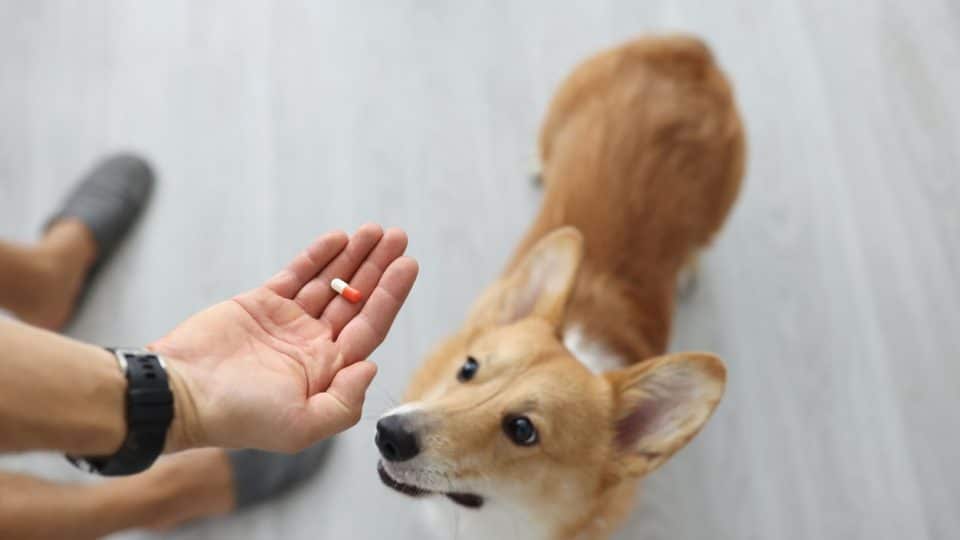
What Can I Give My Dog For Anxiety?
Just like humans, dogs can experience anxiety and stress in various situations. Whether it’s separation anxiety, fear of loud noises, or general nervousness, finding ways to help your furry friend cope with anxiety is essential for their well-being. In this guide, we’ll explore common remedies and medications for dog anxiety, along with their benefits, drawbacks, and administration methods.
Does Your Dog Need Anxiety Meds?
Assessing Your Dog’s Anxiety Before considering medication, it’s crucial to assess the severity and frequency of your dog’s anxiety symptoms. Consult with your veterinarian to determine if medication is the right course of action based on your dog’s individual needs and circumstances.
Non-Medication Approaches In some cases, non-medication approaches such as behavior modification, training, and environmental management may be effective in managing your dog’s anxiety. However, if these methods prove insufficient, medication may be necessary to alleviate your dog’s symptoms and improve their quality of life.
Common Types of Dog Anxiety Medications
| Drug | Potential Side Effects |
|---|---|
| Clomipramine | Reduced appetite, dry mouth, diarrhea, vomiting |
| Fluoxetine | Diarrhea, vomiting, reduced appetite, drowsiness, restlessness, anxiety, trembling, irritability |
| Amitriptyline | Loss of coordination, drowsiness, sedation, insomnia, hunger, anxiety, hallucinations, muscle relaxation |
| Buspirone | Drowsiness, upset stomach, restlessness, dizziness, irregular heartbeat, constricted (smaller) pupils |
Benefits:
- Reduction of anxiety symptoms, leading to improved behavior and quality of life for your dog.
- Alleviation of physical symptoms associated with anxiety, such as trembling, panting, and excessive barking.
- Can be particularly useful in cases of severe or chronic anxiety where non-medication approaches are ineffective.
Drawbacks:
- Potential side effects, including drowsiness, lethargy, loss of appetite, and gastrointestinal upset.
- Some medications may take time to achieve optimal effectiveness and require careful monitoring by a veterinarian.
- Long-term use of certain medications may pose risks of dependency or tolerance development.
How to Administer Dog Anxiety Medications at Home
Follow Veterinarian’s Instructions Always administer anxiety medications according to your veterinarian’s instructions. Follow the prescribed dosage and frequency carefully to ensure your dog’s safety and effectiveness of treatment.
Monitor for Side Effects Keep a close eye on your dog for any signs of adverse reactions or side effects. If you notice any concerning symptoms, contact your veterinarian immediately for guidance.
Stay Consistent Consistency is key when administering anxiety medications to your dog. Stick to the prescribed schedule and dosage, and avoid skipping doses or abruptly discontinuing medication without consulting your veterinarian.
Finding the right approach to manage your dog’s anxiety requires patience, understanding, and guidance from your veterinarian. Whether you opt for medication or explore non-medication alternatives, the goal is to improve your dog’s quality of life and help them feel calm, comfortable, and secure.
Your pets’ happiness and your peace of mind are our top priorities.
Frequently Asked Questions
Yes, there are several lifestyle changes you can make to help reduce your dog’s anxiety naturally, such as providing regular exercise, creating a safe and comfortable environment, establishing a consistent routine, and practicing relaxation techniques like massage or calming music.
If you accidentally miss a dose of your dog’s anxiety medication, administer it as soon as you remember. However, if it’s almost time for the next scheduled dose, skip the missed dose and resume the regular dosing schedule. Do not double up on doses unless advised by your veterinarian.
While anxiety medications can help manage and alleviate symptoms, they are not a cure for anxiety. In many cases, ongoing management and support, including behavior modification, training, and environmental enrichment, may be necessary to effectively manage your dog’s anxiety in the long term.
Yes, there are several natural remedies and supplements that may help alleviate dog anxiety, such as CBD oil, pheromone diffusers, and herbal supplements like chamomile or valerian root. However, it’s essential to consult with your veterinarian before introducing any new treatments to ensure they are safe and appropriate for your dog.
The onset of action for anxiety medications can vary depending on the type of medication and your dog’s response. Some medications may start to show effects within a few days, while others may take several weeks to reach full effectiveness.
No, it’s not recommended to give your dog over-the-counter anxiety medications intended for human use without consulting your veterinarian first. Human medications can be toxic to dogs and may cause serious harm or even death.